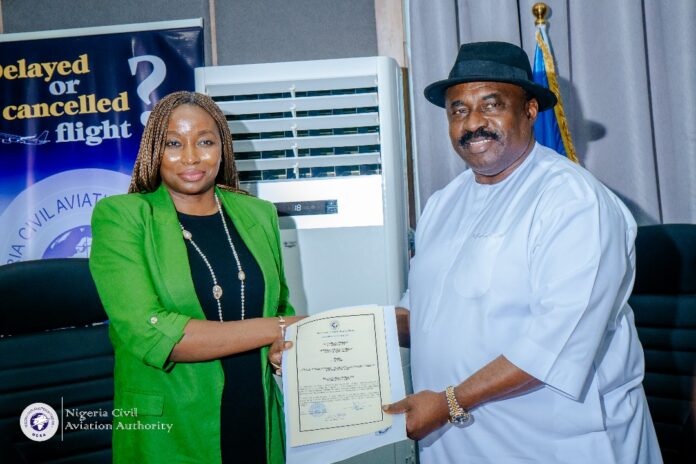The Nigeria Civil Aviation Authority (NCAA) has officially awarded full certification to two of Nigeria’s busiest airports – Murtala Muhammed International Airport (MMIA) in Lagos and Nnamdi Azikiwe International Airport (NAIA) in Abuja.
This move marks a major achievement for the aviation sector after the country’s aerodrome certificates had been inactive since 2020.
Speaking at a recent event in Abuja, Olubunmi Kuku, Managing Director of the Federal Airports Authority of Nigeria (FAAN), proudly announced the recertification of the two airports.
“This recertification is not just remarkable; it is vital for enhancing the country’s aviation infrastructure,” Kuku said. “The completion of this process is a testament to our commitment to providing safe and efficient air travel for all.”
For years, the lack of certification had posed a significant challenge to the country’s aviation sector. Kuku pointed out that the certification process follows strict guidelines set by the International Civil Aviation Organization (ICAO), an international body responsible for setting global aviation standards.
“These standards, particularly those in ICAO’s Annex 14, outline the requirements for safe, efficient airports,” she explained. “We’ve had to undergo rigorous assessments of our facilities, including runway conditions and airfield lighting systems.”
Kuku emphasized that while the certification of MMIA and NAIA was an achievement, it’s not the end of the road. “Some of our runways and lighting systems still need attention to meet the full ICAO standards,” she said. “We are committed to continuing these improvements to enhance the safety and efficiency of our airports.”
She also acknowledged the role of the federal government, especially President Bola Ahmed Tinubu and Aviation Minister Festus Keyamo, in making this recertification possible.
The two airports had originally been certified in 2017, but the certificates expired in 2020, and the COVID-19 pandemic disrupted the recertification process. As a result, FAAN was granted an extension to continue operations while resolving the certification issues.
Chris Najomo, Acting Director-General of the NCAA, explained the lengthy certification journey in detail. “The aerodrome certificates expired in November 2020, and we had to give FAAN an additional six-month extension due to the pandemic,” Najomo said. “There were 136 issues for MMIA and 29 for NAIA that needed to be resolved. This was a huge task, and FAAN worked hard to close these gaps.”
Najomo also made it clear that while the airports have now met the minimum safety standards, they are not yet fully compliant with all ICAO regulations. “This recertification is not an indication that the airports are 100% compliant, but it shows that they have met the minimum certification requirements based on risk assessment,” Najomo explained.
He further noted that the implementation of corrective actions to address any ongoing deficiencies would continue, with regular post-certification inspections ensuring progress.
In addition to runway improvements, the certification process also focused on the quality of the taxiways and airfield systems, which are essential for the smooth operation of aircraft on the ground.
“It’s about ensuring that both the runways and the taxiways are safe, functional, and capable of handling modern air traffic,” Kuku said. “These systems are crucial for ensuring the safe and efficient movement of aircraft, and we continue to make improvements.”
Najomo acknowledged the leadership of Minister Festus Keyamo, highlighting the importance of the aviation sector to the country’s growth and global standing. “This achievement is a reflection of the visionary leadership of Minister Keyamo and President Tinubu’s Renewed Hope Agenda,” he said.
The recertification of MMIA and NAIA comes as part of a broader effort to improve Nigeria’s aviation infrastructure. It follows several years of work to meet international aviation safety standards.
However, as Kuku pointed out, the job is far from finished. “We still have work to do. Some areas, particularly in lighting and runway conditions, need to be addressed,” she said.
Despite these ongoing challenges, the recertification is a positive development for Nigeria’s aviation sector. It signifies a commitment to upgrading infrastructure and improving the safety of air travel, not just for Nigerian passengers, but for international travelers as well.

